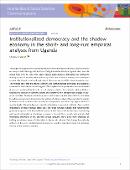Institutionalized democracy and the shadow economy in the short- and long-run: empirical analysis from Uganda
Abstract
This paper investigates the relationship between institutionalized democracy and the shadow
economy in both the long- and short-run. Using time series data from Uganda that cover the
period from 1991 to 2015, this paper applies autoregressive distributed lag method to
investigate this relationship. How democracy affects the shadow economy in less developed
countries like Uganda is not well understood. This paper aims to fill the above knowledge gap.
The findings show that the shadow economy and institutionalized democracy are negatively
correlated in both the short- and long-run. This implies that improvement in institutionalized
democracy significantly hinders the rise of shadow activities. This indicates that institutions
regulate the conduct of economic agents and determine how entrepreneurs engage in eco-
nomic activities. Moreover, institutions are crucial in resource allocation which in turn leads
to welfare improvement. Improvement in welfare of citizens reduces their incentive to engage
in informal sector activities since the formal sector provides the necessary support needed to
operate legally. These findings are robust to alternative econometric methods. Two practical
implications of these findings stand out. First, these findings indicate that reforming the
governance system to facilitate efficient resource allocation could be one way of addressing
widespread informality in developing economies. Second, these results also indicate that
minimizing informality in the economy should gradually move away from emphasis on
tackling proximate causes of informality to democratic reforms that change the authority
patterns. In this case institutionalized democracy is another important channel of mitigating
the rise of the shadow economy.

